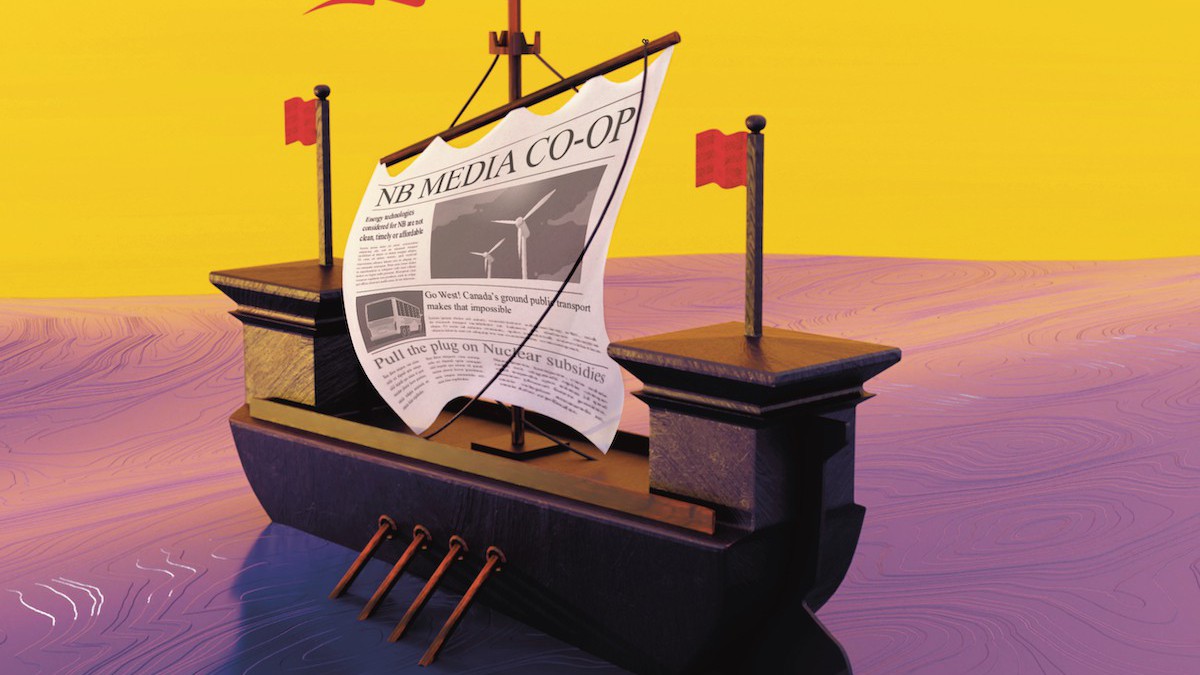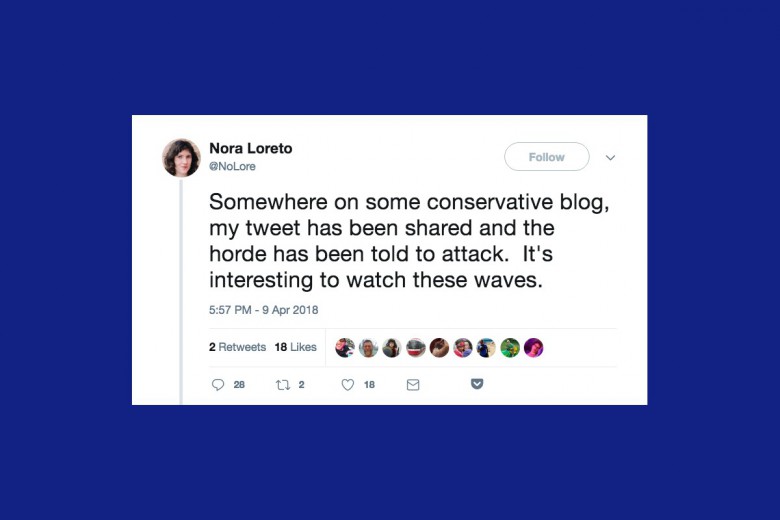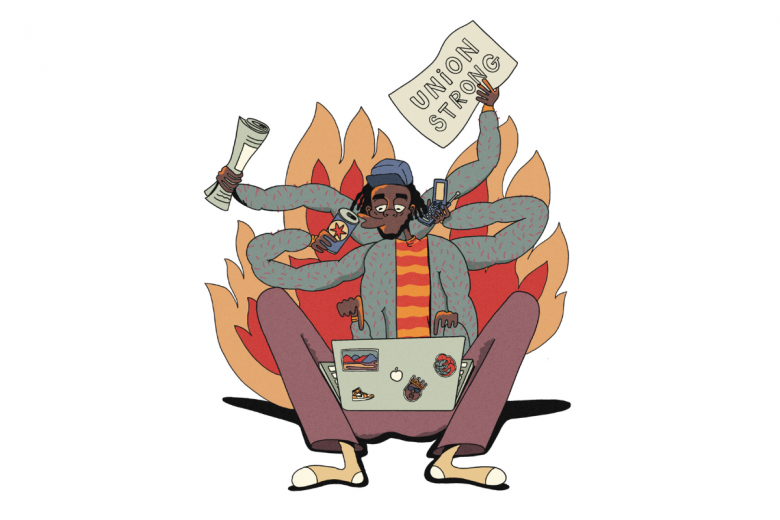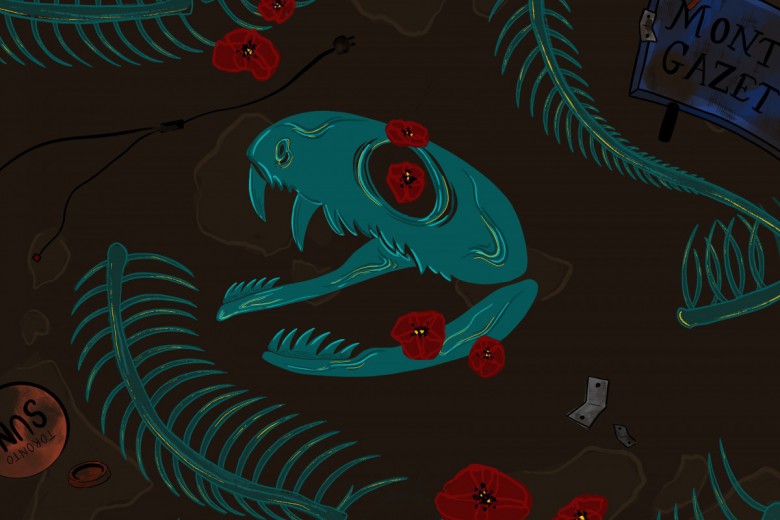New Brunswick. The drive-through province. Backwards and broken. Behind the times. Deprived and defeated. Nothing to see here. Get out. Go west.
The stories we tell about ourselves matter. So what happens when we can’t trust the mirror the media is holding up?
This is a story about the New Brunswick Media Co-op, an independent news outlet born in a climate of missing facts and misplaced blame and fear.
The lands of the Wabanaki
The land known today as New Brunswick was originally and is still inhabited by the Wabanaki – the people of the dawn – a confederacy of Indigenous Peoples that includes the Wolastoqiyik, Mi’kmaq, Abenaki, Penobscot, and Peskotomuhkati. With the arrival of the first French and British colonizers in the 16th century, the land was forever changed.
In the mid- to late 19th century, British imperialists in the new colony of New Brunswick were felling pine and spruce, displacing and dispossessing Indigenous Peoples. Today, after centuries of timber, pulp, and paper serving as the backbone of New Brunswick’s economy, many parts of our forests have been devastatingly clear-cut. The province – which has been extracting fossil fuels for over 300 years and was home to North America’s first petroleum operation – is also grappling with the approaching impacts of climate change: crumbling coastlines, rising seas, and extreme winter storms.
In what Wolastoqi historian Andrea Bear Nicholas calls “settler imperialism,” early colonial authorities handed over land to prospective settlers without asking or compensating First Nations. Last year, six Wolastoqey First Nations began a title claim on the land the province gave to forestry and energy companies, including J.D. Irving Ltd. In a statement, the First Nations’ chiefs declared: “The Wolastoqey share a deep concern with many regular New Brunswickers that reckless resource extraction through mining, forestry and other activities has left our rivers, forests, and lakes on the brink of decimation.” The Wolastoqey have never ceded title to their land.
For decades, the people of New Brunswick had one source of local news: Irving newspapers sold at Irving gas stations in a province dominated by the Irving family.
Until recently, the newspaper publishing company Brunswick News was privately owned by billionaire James K. Irving. His corporation, J.D. Irving Ltd., owned nearly all newspapers in New Brunswick, including the province’s flagship daily, the Telegraph-Journal, along with two other dailies, most of the English weeklies, and several French weeklies.
“The corporate media’s business model is failing,” says Jay, “and so is its ability to speak basic truths about the crises we’re living.”
The Irving empire controls not only the media but also the forestry and energy sectors in New Brunswick. The Irvings’ forestry and paper operations are New Brunswick’s largest private-sector employer, and the Irving Oil refinery is Canada’s largest – all told, they employ an estimated one in 12 New Brunswickers.
Mount Allison University professor Erin Steuter says the family’s chokehold on New Brunswick’s industry and media affects the stories that are told about the company. “When Neil Reynolds left the Telegraph-Journal (Saint John) in 1995 after a stormy reign as editor,” she writes, “he told reporters that the paper’s owner, J.K. Irving, called him every day, telling him what he liked and did not like in the paper.”
Critics of the way the Irvings operate in New Brunswick sometimes call the province a feudal state with an overlord. Others call it a captured state. Still others say it is simply business as usual under capitalism.
In February, Postmedia – the behemoth that already owns the National Post as well as papers in almost every major Canadian city – bought the Irving newspapers, later announcing that Jamie Irving, former publisher of the Telegraph-Journal, would become executive chair of Postmedia in 2023.
Enter the NB Media Co-op
“Another New Brunswick and world are possible.”
This was the hopeful banner under which 200 people from various social justice movements gathered in Fredericton for the 2008 New Brunswick Social Forum. They recognized they had one common problem: the media.
The gathering included the mayor of Saint John, Ivan Court. When Court and his city manager, Terry Totten, had challenged Irving Oil in the port city, including refusing to lower their taxes, they found themselves subject to so much negative coverage in the Irving-owned Telegraph-Journal that Totten resigned and Court stopped talking to the newspaper for a time.
So in this barren media landscape, 14 years ago, they formed a media co-operative. Some attendees were seasoned journalists; others were eager to learn how to write the stories not being told about their communities. Their rallying cry was “don’t hate the media, be the media.”
For decades, the people of New Brunswick had one source of local news: Irving newspapers sold at Irving gas stations in a province dominated by the Irving family.
They were inspired by Canada’s national media co-operative: the Media Co-op, which was established in 2003 and is still in operation today. In its earliest years, it published The Dominion, a monthly magazine that Moira Peters, one of its founders, calls “ahead of its time.” The magazine covered climate justice, social issues, and foreign policy from a grassroots perspective. Local chapters sprang up in Halifax, Vancouver, Toronto, and Montreal, each with their own editorial committees – though all the local chapters have since closed down, leaving only the national organization.
When asked what made the Media Co-op tick in those early years, Peters says the editorial collective was “a group of like-minded, privileged, hard-working people who could afford to be paid a pittance and work basically full time.”
Dru Oja Jay, a co-founder of the Media Co-op, is the publisher of The Breach, a reader- and viewer-supported media outlet that launched in 2021. For Jay, “12 years organizing with the Media Co-op highlighted the tremendous potential of empowering people to take part in the process of co-creating a picture of the world in which they make decisions and take action.”
Media co-ops on the upswing
“The corporate media’s business model is failing,” says Jay, “and so is its ability to speak basic truths about the crises we’re living.”
Corporate media in Canada is itself in crisis. As Google and Meta have snatched away advertising revenue, corporate media has faced declining readership and profitability. In Canada, 260 local news outlets closed between 2008 and 2018. The people bearing the brunt of it are not owners, but media workers and readers. Newspaper CEOs have cashed in – like in 2018, when Postmedia’s CEO took a $1.2 million bonus while shuttering six community newspapers.
Journalists have good reason to want a better business model than the one that saw them lose their jobs so executives could line their pockets with the savings. Media co-operatives are one way out of the crisis.
In Argentina, for example, at least 3,500 people have lost their jobs since 2016 with the closure of 20 Argentinian news outlets. But eight of those outlets have been revived by their staff and are now run as worker co-operatives.
Media co-ops, simply put, are a way for journalists and their communities to take back the media from the clutches of corporations and hedge funds.
In any co-op, the people who create and use the products and services also own and manage the organization. The models vary, but the principle of democratic ownership is the same. Some publications, like La Jornada, a major daily in Mexico City, are worker co-operatives owned by journalists and other staff. Others, like the NB Media Co-op, are multi-stakeholder co-ops where readers, editors, and contributors manage the organization.
Here’s how it works: an individual can become a member of the NB Media Co-op by making an annual donation of usually $30 or by donating $2.50 to $100 every month. Each year, members elect a board of directors tasked with ensuring the viability and growth of the co-op. The members also elect two editorial boards – one for coverage in English and one for French. These boards collaborate with writers to edit and fact-check their contributions.
"Broadly speaking, when given the opportunity to co-operate and decide collectively, people bring more of their foibles, conflicts, and difficulties but also more of their energy, dedication, and creativity.”
The boards are made up of volunteers – which brings its own challenges. When people are juggling jobs, school, and activism, it can be hard for them to show up to make big decisions quickly, cover breaking news, and manage the expectations of community members hungry for better coverage of issues that matter to them. In 2022, the NB Media Co-op made the major decision to hire a manager, which put additional pressure on the board of directors to make sure the co-op could afford to pay their salary.
“It was not easy to take that decision to hire someone after a decade of being entirely volunteer-run,” says Sarah Kardash, one of the longest-serving board members and volunteers for the co-op. “We have our usual fundraising efforts, where we organize an annual membership drive in March and send appeals to labour unions to support the co-op’s work. But we are also committed to paying a living wage, which means that we have an obligation now to really focus on growing our membership and revenue.”
Making decisions takes longer as a co-op: bylaw changes, additions to the editorial board, and big organizational questions need to be voted on by members at a general meeting, which typically happens just once a year.
But, in the end, democracy is worth it, Peters and Jay insist.
“Co-operative processes take more time, but pay off with deeper investment,” Jay explains. “As a way of running an organization, it’s more difficult in the short term and more rewarding in the long run. Broadly speaking, when given the opportunity to co-operate and decide collectively, people bring more of their foibles, conflicts, and difficulties but also more of their energy, dedication, and creativity.”
The Irvings’ consent-manufacturing apparatus
David Gordon Koch joined the NB Media Co-op as its manager in 2022, the Co-op’s first ever paid staff. Before that, he had worked for two years as a reporter for the then-Irving-owned Times & Transcript. For Koch, his time at the latter was “incredibly frustrating” and “gruelling.”
Critics of corporate media ownership say that it threatens media independence, the quality of journalism, and the conditions of work. “You encounter limits if you push too hard,” Koch recalls, “particularly on the forestry side of things. There was a chill on writing about glyphosate; this was well known. I would get significant pushback on stories about climate change even if they didn’t directly involve Irving interests.”
Glyphosate is a chemical used to kill competing plants in tree plantations and is considered a potential carcinogen by the World Health Organization. New Brunswick sprays a larger area with glyphosate than any province but Ontario, and within the province, J.D. Irving Ltd. sprays the most glyphosate of any forestry company. The company fiercely defends the practice, with one of its representatives calling critics “Karens.” The NB Media Co-op, meanwhile, has closely covered the overwhelming opposition to the use of glyphosate in the province’s forests.
Journalists have good reason to want a better business model than the one that saw them lose their jobs so executives could line their pockets with the savings.
It’s not just environmental journalism that feels the Irvings’ chill – labour journalism does, too. When Koch tried to file a story in 2021 with quotes from labour leaders raising questions about Walmart’s union-busting record after the company announced a new facility in Moncton, Koch found himself being censored.
“On more than one occasion the editors wouldn’t allow the story to run with a mention of Walmart’s closure of their store in Jonquière, Quebec, when the workers there tried to unionize,” Koch says. “The reason given was that the incident, which happened in 2005, was too long ago.”
The Supreme Court of Canada ruled in 2014 that the 2005 store closure was illegal. In 2007, Human Rights Watch released a 214-page report accusing Walmart of creating a “climate of fear” to prevent unionization in its stores. And only three Walmart stores out of nearly 400 across Canada have successfully unionized; at all three, employees later voted to decertify the union.
The pro-industry and pro-employer slant of the Times & Transcript comes as no surprise to Susan O’Donnell, co-author of a 2019 study analyzing editorials published in Brunswick News papers. The study found the papers systematically pushed the narrative that corporate resource extraction was necessary for the survival of rural communities. “We called this ‘manufacturing consent,’ echoing the idea popularized by Noam Chomsky and Edward S. Herman that mass media like Brunswick News are ideological institutions that can influence public opinion to support neoliberal political and economic regimes,” says O’Donnell.
Koch says the NB Media Co-op “provides a crucial response to [the] consent-manufacturing apparatus” of Brunswick News.
“I was just so happy to work with a group of people trying to build and muster the resources through community support and solidarity to pay people to do that hard work,” he adds.
Co-operation
For the NB Media Co-op, independent journalism is as much about combatting corporate control as it is about co-operating – rather than competing – with other independent media outlets.
In 2021, the Co-op partnered with CHCO-TV, a community television station based in St. Andrews. Together, we produced the NB debrief, a news show in which Tobin LeBlanc Haley, an assistant professor of sociology at the University of New Brunswick, speaks to social justice activists otherwise sidelined by corporate media. For Haley, “The voices included in the NB Media Co-op are often left out of [corporate media] or are treated as the object of those media stories rather than the authors of their own story.”
One of the most popular NB debrief episodes featured Canadian Union of Public Employees NB president Steve Drost and regional director Sandy Harding telling the story of the historic 2021 strike, in which nearly 22,000 front-line workers walked off the job demanding decent wages. Irving media editorials repeatedly painted front-line workers as greedy, and the government took out full-page ads in Irving newspapers to discredit the strikers’ demands. The NB Media Co-op instead provided a platform for the workers to tell their own stories.
Media co-ops, simply put, are a way for journalists and their communities to take back the media from the clutches of corporations and hedge funds.
For us, media co-ops are a way for communities to tell our own stories with integrity and accountability. What’s important about a multi-stakeholder media co-op is that anyone, anywhere can start or join one – they can learn journalism skills and work together to help create the media landscape they want.
Peters says she has a hard time tuning in to the media today: “What’s missing in the world today is just storytelling – storytelling that really reflects what humanity wants and what humanity needs. We need stories to inspire us to do better.”
After 13 years, the NB Media Co-op invites you to take a good look around and stay awhile. If you do, you will find people ahead of the times.







